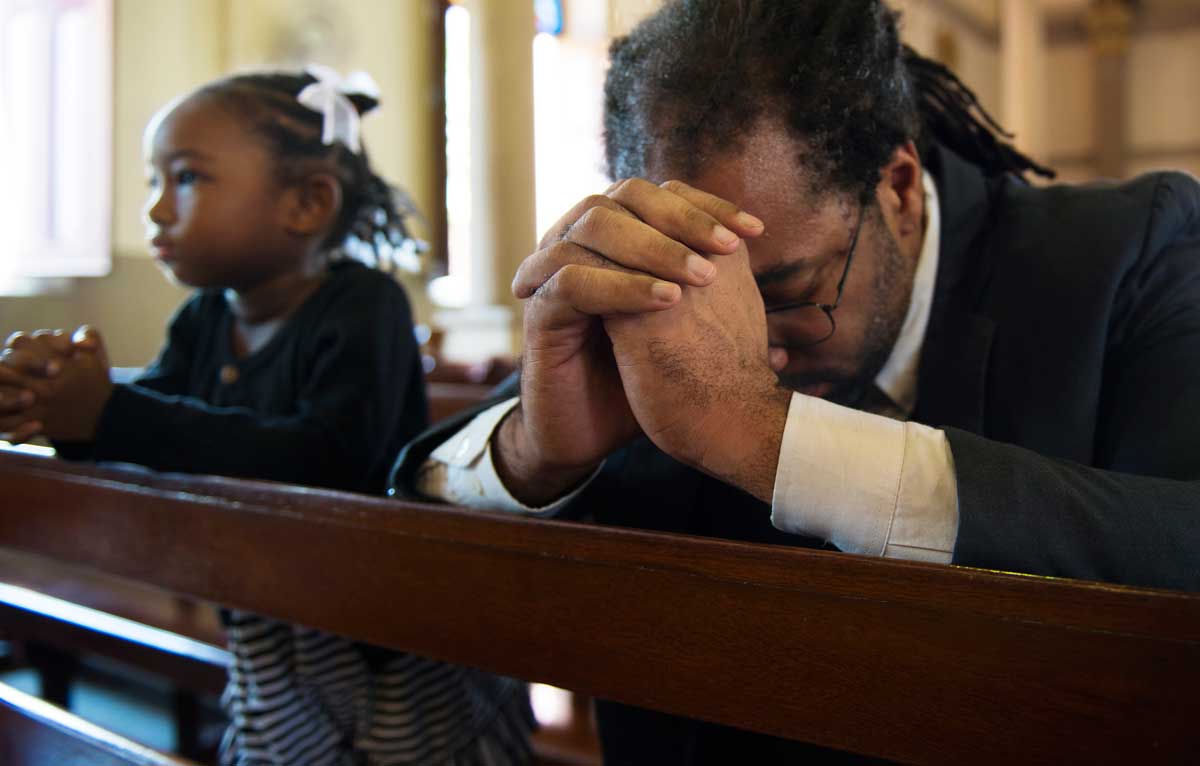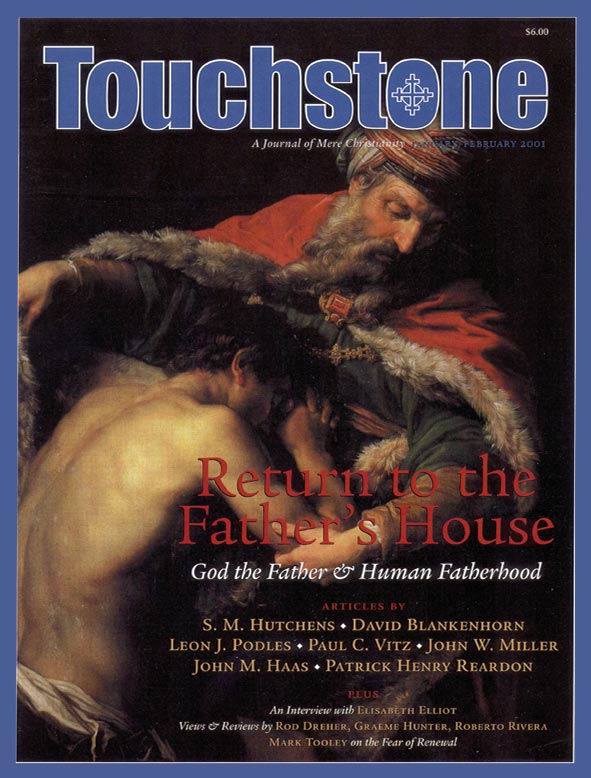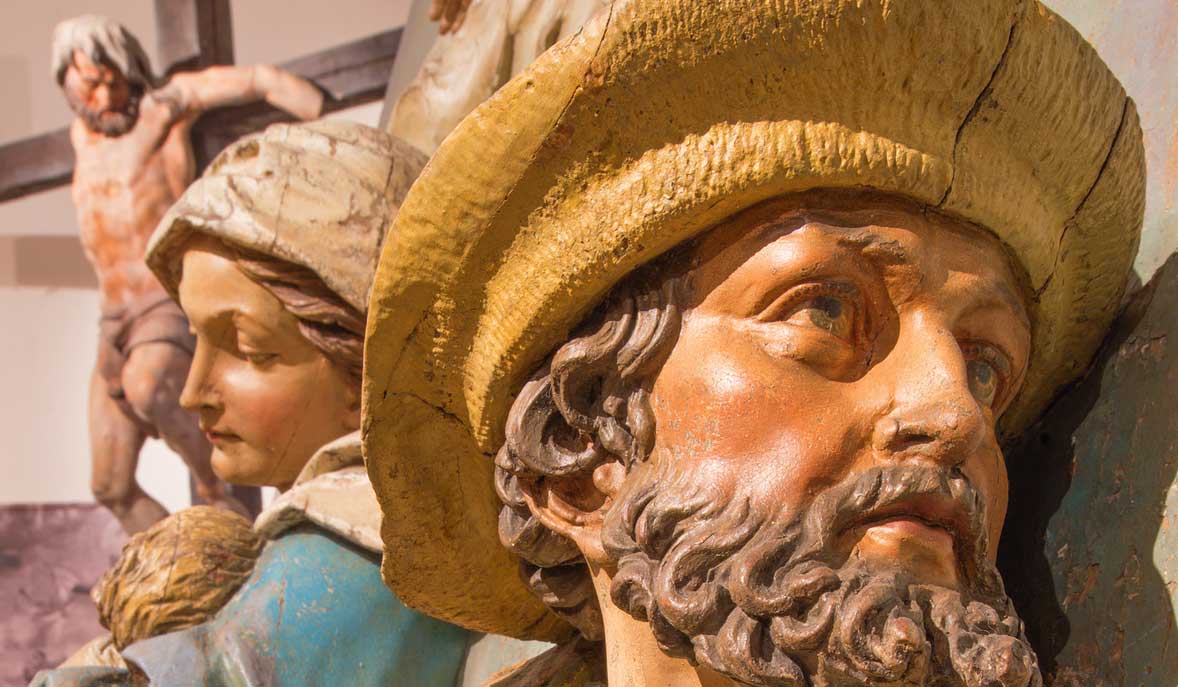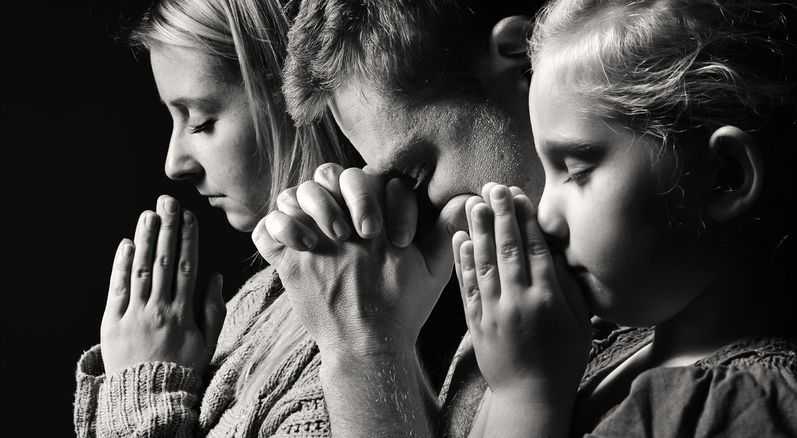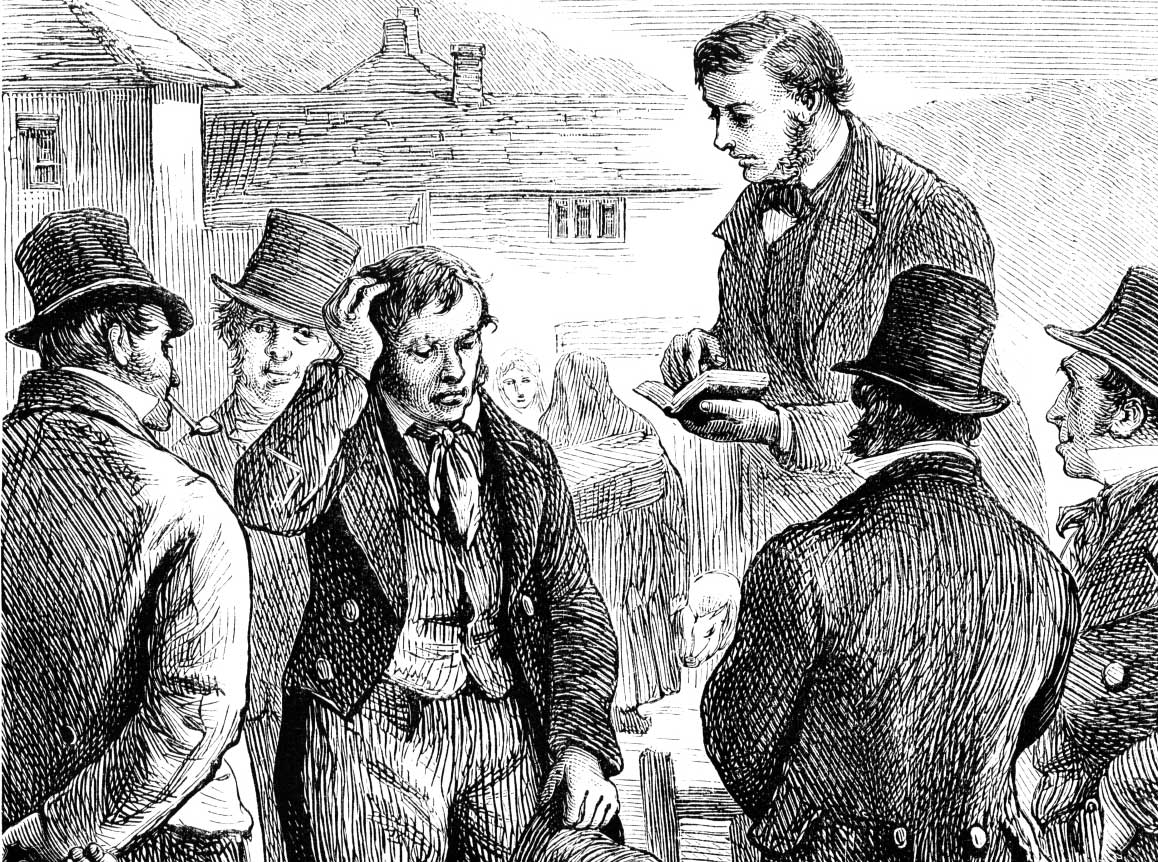Feature
The Christian Heart of Fatherhood
The Place of Marriage, Authority & Service in the Recovery of Fatherhood
The smell of the anesthetic gas, ether. The speck of a glowing orange ember in a black night. The pervasive smell of cigar smoke. Sights and smells that are sources of enduring comfort to three old men. Sights and smells that evoke a father’s love.
The cardinal archbishop who greeted me had grown frail with the years but had an intellect and wit as keen as a young man’s. At one point in our conversation he began to reminisce.
“You know,” he said, “my father would come home every day for lunch. I would look forward to his coming through the door because he would always pick me up in his arms and hold me. He was a dentist, and he often smelled of the ether he used to anesthetize his patients. To this day I feel secure and reassured when I smell ether.” There is probably not another human being who holds that sentiment, but this venerable cardinal does because he associates it with the love of a father.
It was dusk. I sat beside the bishop on the back porch of his residence out West. He leaned back in his chair and lit a cigar. The smoke wisped about his head. He slipped into revery as though the smoke were a trigger for memories past. “I grew up in Chicago,” he said. “Every Saturday morning we kids had to clean the house. We swept down the stairs, washed floors and windows, polished furniture. After lunch, with the spotless house smelling as fresh as a spring morning, my father would turn on the baseball game on the radio, settle into his favorite chair, and light up his cigar. To this day I cannot smell cigar smoke without a sense of security and peace.”
I was probably five years old. The evening church service was over and I had gone off to play with my friends in the crowd. Slowly the parishioners began to drift off into the night with their families. The church lights were turned off and I finally found myself standing beside a few strangers finishing their conversations. The night was black and I could barely see the outline of the church across the street. I began to panic. Where were my parents? Had they forgotten me? Did they leave without me? Who were these people beside me? I was about to break into tears, afraid to speak to the few remaining strangers, when I saw a tiny orange light swinging back and forth as it moved forward in the blackness across the street. I saw nothing but the orange dot. I could not see anyone with it. But I somehow, instinctively, inchoately, recognized the motion of my father’s hand holding a cigarette as it swung at his side as he walked. To this day, fifty years later, I remember the sense of joy, of relief, of excitement. I knew it was my father, even though I could see nothing of him. I knew I was okay, I was safe, I was secure.
Attenuated Fatherhood
Today sociologists and psychiatrists and researchers have to publish reports with the quantifiable, statistical data of their studies to try to convince society that fathers have a critically important role to play in the lives of families and in forging a just and humane social order. Somehow that which has been universally celebrated in myth, reinforced in parables, acclaimed in song, depicted in statuary and painting, nurtured in human hearts, and cherished in unfading memories is somehow not true unless it can be reduced to statistical analysis.
Emily Rosenbaum of Columbia University and Denise B. Kandel of Columbia and the New York State Psychiatric Institute wrote on drug abuse and teenage sexual activity a number of years ago. “Several studies support the importance of family structure on precocious sexual activity. The likelihood of early sex is consistently higher among adolescents living in [a] non-intact [rather] than in an intact family. . . . Furthermore, the emotional turmoil of a divorce or separation may prompt the teenager to seek comfort outside the home.” In other words, it would seem that if the State wanted to reduce teenage sexual promiscuity and the accompanying threats of illegitimate children or the dangers of abortion or the spread of AIDS, it would do all in its power to strengthen families rather than undermining them through no-fault divorce and granting the privileges of marriage to homosexual relationships.
Dr. Thomas Ewin Smith of the University of South Carolina did an extensive survey of the relevant literature and wrote:
There is considerable evidence . . . that lower academic achievement of children and adolescents is related to parental divorce . . . [M]ajor reviews of relevant research . . . have found that children from two-parent families have higher measured mental aptitude, academic achievement, and school grades than those from one-parent families . . . being in a one-parent family significantly reduced the reading and mathematics achievement scores of both white and black elementary school students.
Did the good cardinal and the most reverend bishop need to read those studies to know how important and irreplaceable is the father’s place in the home and in society? Did not the noble pagan Homer, in whose heart the divine law was also written, capture a universal reality when he depicted the pattern of human existence in the hero Aeneas fleeing burning Troy, bearing his aged father on his shoulders and leading his tiny son Ascanius by the hand? Did the ancient Hebrews not do what comes naturally to all peoples when they preserved and venerated the stories of the patriarchs, with all their shortcomings? Did not the Gospel writers consider it of the greatest importance to list the forefathers of Jesus, stretching back to Father Abraham in one genealogy and Father Adam in the other? Has not the Christian Church experienced renewal, time and time again, when its adherents returned to the teachings of the early church fathers of East and West? Did most of you and I not grow up venerating the memory of George Washington, the Father of our Country?
Yet today we live in a society so rarefied, so attenuated in its own instincts and so in denial of its natural longing for a father’s protective love that even common sense can no longer gain a hearing in our highest judicial councils and in our elite educational institutions.
A devastating blow was struck against fatherhood as well as motherhood in 1973 when the Supreme Court removed the protection of the State from innocent unborn children in its reprehensible Roe v. Wade decision. Many states, reeling from this exercise of raw judicial power, tried to pass measures to protect unborn life as best they could within the parameters of the Court’s decision. Missouri passed a law requiring parental consent for minor girls and spousal consent for married women before they could abort their children. Of course no parent or spouse can morally consent to the direct killing of an innocent human being. But the highest Court of the land left Missouri and other states with few options. However, even these restrictions on abortion in Missouri proved too restrictive for Planned Parenthood, who sued the state. In 1976 in Planned Parenthood v. Danforth, the Court struck down Missouri’s spousal and parental consent provisions as unconstitutional. Consequently in this country a father is prevented, by the coercive powers of the State, from intervening in any way to try to save the life of his own unborn child.
In truth, the father has not only the right, but also the obligation, to try to intervene to protect the life of his child. But the Court conceded no such right. Why? Because it claimed the State had no such right, and if the State had no such right, how could a mere citizen have it? The Court wrote: “the State may not constitutionally require the consent of the spouse . . . since [the State] cannot delegate to a spouse a veto power which the State itself is absolutely and totally prohibited from exercising.” The audacious arrogance of such a statement is imaginable only in a society that has lost sight not only of God but also of human nature itself. A father has natural rights and obligations from God arising from the father’s very nature. They are not granted by the State. They can only be, and indeed must be, acknowledged by the State.
Fatherhood Linked to Marriage
Most fundamentally, and again, in a way no longer acknowledged in our society, man derives his fatherhood from his spousal relationship with his wife. In ancient Rome, when the priest presided over the nuptial ceremonies, he would ask the man, “Are you prepared to become a father?” In that question was acknowledged the common task of parenthood that the man was about to take up with the woman he was marrying.
There is no true fatherhood without marriage, since in the divine plan, and thus in human nature and in the natural social order, fatherhood is inextricably linked to the motherhood of the wife. Marriage, not biological capability, enables man to become a true father. This was true even for St. Joseph, the chaste Guardian of the Virgin Mary and Jesus. Pope John Paul II shared this teaching with us in his encyclical on the earthly father of Jesus, Redemptoris Custos (Guardian of the Redeemer):
As can be deduced from the gospel texts, Joseph’s marriage to Mary is the juridical basis of his fatherhood. It was to assure fatherly protection for Jesus that God chose Joseph to be Mary’s spouse. It follows that Joseph’s fatherhood—a relationship that places him as close as possible to Christ, to whom every election and predestination is ordered (cf. Rom. 8:28–29)—comes to pass through marriage to Mary, that is, through the family.
Elsewhere we read in the same encyclical: “It was from his marriage to Mary that Joseph derived his singular dignity and his rights in regard to Jesus.” Here we see how more ample, more sublime, indeed more transcendent is fatherhood because of its inescapable relationship to the child and to the mother and, indeed, to God himself.
David Blankenhorn, in his book, Fatherless America, has pointed out how attenuated fatherhood has become in our day. It has been reduced to a biological factum, a delivery system for a package of genetic material. Yet the truth of fatherhood is seen in its capacity to transcend ineffably the simply biological. This can be seen again in the example for all earthly fatherhood, St. Joseph. The Holy Family serves as the model for all families and, as Pope John Paul tells us, “In this family, Joseph is the father: his fatherhood is not one that derives from begetting offspring; but neither is it an ‘apparent’ or merely ‘substitute’ fatherhood. Rather, it is one that fully shares in authentic human fatherhood and the mission of a father in the family.” Joseph, without having begotten Jesus with his seed, still “fully shares in authentic human fatherhood and the mission of a father in the family.”
We earthly fathers, who, by divine institution and the natural order, beget, with God, our children by sowing the seed do not share in full authentic fatherhood unless we manifest the spiritual qualities of love and self-sacrifice. Any brute can sire a child under the right conditions.
Fatherhood: Gift of Man or God?
There are so many developments in contemporary society deleterious to a sound understanding of fatherhood that one hardly knows at what point to launch a counterattack. Surely one of the worst is the rise of the biotechnology industry that literally mines genetic material from the bodies of men and women and engenders human lives by the tens of thousands in petri dishes. About a year ago I gave a paper dealing with reproductive technologies. The only ethical issue that anyone could muster the courage to address was how many children should actually be engendered by one man’s sperm donation. It could of course quite literally be tens of thousands.
The President’s National Bioethics Advisory Commission’s report on cloning repeatedly referred to our creating human life in laboratories. However, we humans cannot create human life. It is impious, indeed sacrilegious, to suggest that we can. At their wedding, a man and a woman exchange rights to certain actions that of their nature are apt for the generation of children. A husband and wife make love; they do not make babies. Marital relations are not a manufacturing process. However, remarkably, that is precisely how it is presented in the report of the National Bioethics Advisory Commission. Just one way among others that human life is created.
But fatherhood is a gift that is granted by God when a man and a woman give themselves to one another in self-giving love. It is a gift, a privilege, a trust, because the true Father of every child who comes into the world is God himself. We have been entrusted with the care of his children whom he has allowed us to claim also as our children, as the embodiment of the love of spouses for one another.
One simple way we can help restore a sense of fatherhood is by being careful about the language we use, as it not only expresses the reality we know but also helps to make that reality accessible to the society within which we live. Never ought we presume to say that we create life, whether in the petri dish or in the marriage bed. And we should not allow our politicians or government officials to use such language since it, most fundamentally, constitutes a lie.
Marriage & Fatherhood
Marriage provides the divinely established institutional context for the realization of fatherhood. It ought not to be surprising that a society that has diminished marriage and that has reduced it to an arbitrary social arrangement will also diminish that vocation that has its true place only within marriage. We cannot speak of the restoration of fatherhood without speaking of a restoration of marriage to its true reality as, in some Christian traditions, a sacrament, or in other traditions, a divine ordinance. There is hardly any society that does not attribute a sacral quality to marriage.
However, what must be affirmed in our day, for the sake of society, for the sake of the family of which the father is the guardian, is that marriage is not an arbitrary social institution, but an objectively natural one. As Pope Pius XI taught in Casti Connubii in 1930 in harmony with the entire Christian Tradition:
Let us . . . recall this immutable, inviolable, and fundamental truth: Matrimony was not instituted or reestablished by men but by God: not men, but God, the Author of nature, and Christ our Lord, the restorer of nature, provided marriage with its laws, confirmed and elevated it; and consequently those laws can in no way be subject to human wills or to any contrary pact made even by the contracting parties themselves . . . the perpetual indissolubility of the marriage bond, its unity and its stability, derive from God Himself.
For the sake of fatherhood, for the sake of marriage and family, which have been entrusted to fathers, we undertake whatever measures are necessary to protect this divinely established institution. One way to protect it today against feminist and homosexual assault through the judiciary is to pass Defense of Marriage Acts in every state in the Union, defining marriage as the union between one man and one woman.
And this divinely instituted marriage has a dynamism built into it that, in accordance with its nature, engenders mothers, fathers, and children. As this current pope is fond of saying, the communion of husband and wife blossoms into the community of family. In his Apostolic Exhortation on the Family, Familiaris Consortio, John Paul II writes:
Within the marital and family communion-community, the man is called upon to live his gift and role as husband and father. In his wife he sees the fulfillment of God’s intention: “It is not good that the man should be alone, I will make him a helper fit for him,” and he makes his own the cry of Adam, the first husband: “This at last is bone of my bones and flesh of my flesh.”
The Witness of My Family
My father was not formally educated in theology, but he had a wisdom born of a life of virtue, prayer, and the study of Scripture and an attitude of self-sacrifice. The day of my marriage, in the church, before the ceremony, he called me aside. He always had words of advice for me, and this occasion was no different. However, I was not disposed for advice at that moment. I had more important things on my mind. Did the best man have the ring? Did I make the reservations at the motel? Will I get her name right when we exchange our vows?
“Not now, Dad,” I begged. “Maybe later.”
“No. Now,” he said gently. I had little choice.
He then imparted some advice that I still remember. “John,” he said, “the most important thing you will ever be able to do for your children is to love their mother.”
I must admit, the advice was promptly forgotten. However, years later, with a number of little ones underfoot, my father’s words came back to me: “John, the most important thing you will ever be able to do for your children is to love their mother.”
I came to notice a certain pattern of behavior in the house. If my wife and I, that is, if the mother and father of our children, were disagreeing on a subject in front of the children, they would become uneasy. The children would be playing in our bedroom, and we would begin to disagree on something—usually the checkbook. Even though we would not exactly be fighting, the tension was certainly on the rise. I would notice that the children would become quieter, then fall silent. They would slip out of the room and warn others in the house: “Look out! Mother and Dad are fighting. Don’t go upstairs!”
When there was tension between my wife and me, the children would grow uneasy, insecure. However, if one of the children should catch my wife and me kissing in the kitchen, word went quickly through the house on that occasion as well. Then the response was smiles and giggles. The children felt secure, loved. My father’s words came back to me: “John, the most important thing you will ever be able to do for your children is to love their mother.”
But I found the converse of that was true as well. The greatest thing I could ever do for my wife was to love her children.
I would come home from work, exhausted, after a bad day. I would find my wife in the kitchen and would be anxious for a sympathetic ear. I would begin recounting how terribly the day had gone when our first-grader would come running in. He would begin chattering about his latest favorite game. (I think the latest one is called Pokémon or something.)
“That’s nice,” I would say and return to my story to capture my wife’s sympathy.
“Wait a minute,” she would say. “Your son is talking to you.”
“Yeah, I know. I heard him,” I would respond.
“Pick him up,” she would retort. “Hold him. Talk to him.”
So I would pick him up, set him on the kitchen counter and listen intently to his astute trading of Pokémon cards with other first-graders and learn how he had bested all of them in the trades. Finished, he would jump down off the counter and run off. When I turned to look at my wife, she was standing there with a broad smile on her face, finally ready to hear my tale of woe and to offer her love and sympathy.
That description of dynamic forces at work in the family is what the theologians refer to with obtuse, scientific terminology: the inseparability and hierarchical ordering of the ends of marriage.
The truth is that fatherhood is inextricably linked to motherhood, to marriage, to the embodiments of the love of husband and wife known as children.
The Father’s Gift
Within the family the most important thing that can be done to recover a sound understanding and sense of fatherhood is for the husband to give himself entirely to his wife. And the husband does this principally by exercising the headship over wife and children granted him by God himself. God, in granting this headship to husband and father, gives him a share in his own solicitude and loving authority.
In my opinion the most profound passage in Scripture dealing with familial relations is found in the fifth chapter of Ephesians in which the roles of family members are to be patterned after the model of Christ the Bridegroom and his Bride the Church. St. Augustine referred to this as the ordo caritatis or the order of love. In his great encyclical on Christian marriage, Casti Connubii, Pope Pius XI wrote:
This order includes both the primacy of the husband with regard to the wife and children, the ready subjection of the wife and her willing obedience, which the Apostle commends in these words: “Let wives be subject to their husbands as to the Lord, because the husband is the head of the wife, as Christ is the head of the Church.”
Remarkably, this passage is often viewed apart from the Christian reality within which it must be situated. For some reason people will stop at “Let wives be subject to their husbands.” But this passage tells us how they are to be subject to their husbands—as to the Lord. How are Christian husbands to be the lords of their wives? As Christ is Lord. It is a lordship of service and of sacrifice.
Jesus himself is the model for the headship of the husband and the father. He taught us: “The kings of the Gentiles lord it over them and those in authority are addressed as master. But among you it shall not be so. Rather let the greatest among you be as the least and the leader as the servant.” (Luke 22:24ff.) He then took a towel, wrapped it around his waist and washed their feet.
What wife, what children would not subject themselves to such a husband, to such a father. In the fifth chapter of Ephesians wives are exhorted to allow their husbands to serve them, indeed, to sacrifice themselves for them as Jesus did for his Bride the Church.
My father exercised that very kind of headship over our family. He was always thoughtful and attentive to our needs. My hobby as a boy had been Indian lore. I will never forget the Christmas that he managed to find imitation Eagle feathers for my headdress. To this day, I don’t know where he found them.
He knew my mother loved a candy known as Irish Potatoes. The candy store only sold them around St. Patrick’s Day. They were made of coconut, sugar, and marzipan, dusted with cinnamon to look like potatoes, with tiny nuts to look like the eyes of a potato. Faithfully, every St. Patrick’s Day he would bring my mother her favorite candy.
One day when I was at college I received a phone call that my father was ill and a neighbor was coming to pick me up and bring me home. When we arrived at the hospital I learned that my father had suffered a massive heart attack. The pastor took me aside, told me that my father would probably not live through the night and that I should be prepared to assume new responsibilities in the family. I learned that while I was off enjoying college life—joining a fraternity—traveling, my father was holding down three jobs to make ends meet. He was literally pouring out his life for us.
I prayed fervently at his bedside during the night, listening to the beeping of the monitor and watching the blinking green lights indicating the weak but steady beat of his heart. Through burning eyes I watched the morning light announce a new day as I thanked God for having seen my father through the night.
He made it through the next night and the next. However, he was still unconscious, the upper part of his body covered with an oxygen tent. A nurse first discovered he had regained consciousness when she heard him whistling a song in the oxygen tent and keeping time with his big toe.
One afternoon he motioned my mother to the bedside. He was still in the oxygen tent and had tubes in his arm and up his nose. My mother leaned over so she could hear his weak, raspy voice.
“Would you open the top dresser drawer?” he asked her, barely audibly. She did and to her astonishment found a box of Irish Potato candies. It was St. Patrick’s Day!
Apparently when he had regained his wits, he asked a nurse the date. When she told him, he realized it was near St. Patrick’s Day and arranged for her to buy the candies for my mother with the assurance he would pay her back.
The Recovery of True Fatherhood
That is the headship of father and husband of which the Scriptures and our Christian Tradition speak. It was the headship of Joseph in the Holy Family. The Liturgy of the Catholic Church declares in the Preface of the Mass for the Solemnity of St. Joseph: “God placed him at the head of his family, as a faithful and prudent servant, so that with fatherly care he might watch over his only begotten Son.”
In his encyclical of 1889, Quamquam Pluries, Pope Leo XIII wrote:
He among all stands out in his august dignity, since by divine disposition he was guardian, and according to human opinion, father of God’s Son. Whence it followed that the Word of God was subjected to Joseph, he obeyed him and rendered to him that honor and reverence that children owe to their father.
The Word of God in the flesh was subject to the headship of his earthly father!
Pope John Paul II points out: “Besides fatherly authority over Jesus, God also gave Joseph a share in the corresponding love, the love that has its origin in the Father ‘from whom every family in heaven and on earth is named’ (Eph. 3).”
There is no true authority without love, for God puts authority into the hands of men that they might be at the service of others. There is nothing effete or weak about such an exercise of authority. It is the manly exercise of authority that is the antidote to the feminizing trends seen in today’s Christian Churches. It is the virile readiness to sacrifice all in defense of the weak and the vulnerable, women and children, the old and infirm. It is the antithesis of the “wimpman” to which Dr. Paul Vitz refers with no lack of disdain. (See “The Father Almighty: Maker of Male & Female” by Paul C. Vitz in this issue.)
Such an exercise of authority, of Christian headship, communicates to the child the love of the Father that the child can requite. Our current Holy Father knows profoundly of such reciprocity in human love between father and son and knows it was there in an unimaginable degree between Joseph and Jesus. He asks: “Why should the ‘fatherly’ love of Joseph not have had an influence upon the ‘filial’ love of Jesus? And, vice-versa, why should the ‘filial’ love of Jesus not have had an influence upon the ‘fatherly’ love of Joseph, thus leading to a further deepening of their unique relationship?” What an incredibly sublime thought, that the earthly love of Joseph for the Son entrusted to his care should have influenced even the perfect love of that Son! This is surely a joy and a mystery and a stimulus to us to mirror that love toward our own children, toward our own parents, toward our heavenly Father himself.
My wife recently heard a story on retreat about a father and his young son. The father lived for his boy and always found time to say his prayers with him at night, to play soccer in the backyard, and to hike along their favorite stream to catch frogs. The son fell ill and was diagnosed with a terminal disease. As his life began to draw to a close, the father sat on the edge of the bed holding his son’s hand. In a quiet voice he asked the boy if he was afraid of dying and going to heaven. “No, Dad,” the boy said. “Not if God is like you.”
A recovery of fatherhood will come only from where the original transforming understanding of fatherhood came from, the living out in Christian homes and in Christian communities of the reality of fatherhood, natural and divine. It was, after all, the Christian Church that taught the world the true nature of God: a solicitous, forgiving heavenly Father whose love literally knows no bounds.
The societal recovery of fatherhood will be accomplished only as it is recovered in Christian homes and Christian churches. It will come eventually to be articulated once again in court decisions, federal and state laws, in Defense of Marriage Acts. It will not be easy, and it will undoubtedly take considerable time with considerable effort. Virgil declared “Tantae molis erat Romanam condere gentem!” “Such a toil it was to found the Roman people!” No less a toil shall be required for a recovery in our society of true understanding of fatherhood as found in the revelation of Jesus Christ.
John M. Haas is President of the International Institute for Culture, Philadelphia, and President of The National Catholic Bioethics Center in Boston, and he travels and lectures extensively. Dr. Haas lives in Philadelphia with his wife and nine children.
subscription options
Order
Print/Online Subscription

Get six issues (one year) of Touchstone PLUS full online access including pdf downloads for only $39.95. That's only $3.34 per month!
Order
Online Only
Subscription

Get a one-year full-access subscription to the Touchstone online archives for only $19.95. That's only $1.66 per month!
bulk subscriptions
Order Touchstone subscriptions in bulk and save $10 per sub! Each subscription includes 6 issues of Touchstone plus full online access to touchstonemag.com—including archives, videos, and pdf downloads of recent issues for only $29.95 each! Great for churches or study groups.
Transactions will be processed on a secure server.
more on fatherhood from the online archives
more from the online archives
calling all readers
Please Donate
"There are magazines worth reading but few worth saving . . . Touchstone is just such a magazine."
—Alice von Hildebrand
"Here we do not concede one square millimeter of territory to falsehood, folly, contemporary sentimentality, or fashion. We speak the truth, and let God be our judge. . . . Touchstone is the one committedly Christian conservative journal."
—Anthony Esolen, Touchstone senior editor





